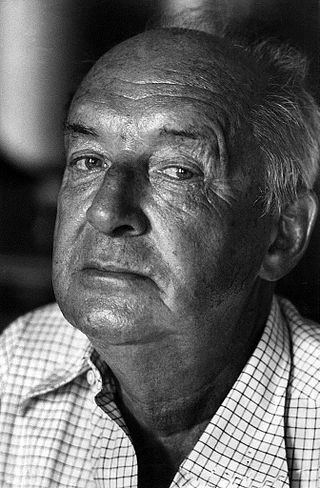
Vladimir Vladimirovich Nabokov, also known by the pen name Vladimir Sirin, was an expatriate Russian and Russian-American novelist, poet, translator, and entomologist. Born in Imperial Russia in 1899, Nabokov wrote his first nine novels in Russian (1926–1938) while living in Berlin, where he met his wife. He achieved international acclaim and prominence after moving to the United States, where he began writing in English. Nabokov became an American citizen in 1945 and lived mostly on the East Coast before returning to Europe in 1961, where he settled in Montreux, Switzerland.
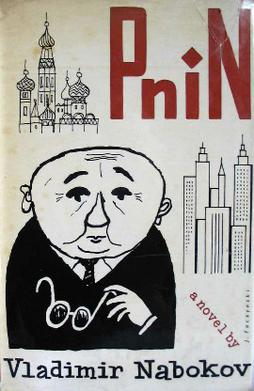
Pnin is Vladimir Nabokov's 13th novel and his fourth written in English; it was published in 1957. The success of Pnin in the United States launched Nabokov's career into literary prominence. Its eponymous protagonist, Timofey Pavlovich Pnin, is a Russian-born assistant professor in his 50s living in the United States, whose character is believed to be based partially on the life of both Nabokov's colleague Marc Szeftel as well as on Nabokov himself. Exiled by the Russian Revolution and what he calls the "Hitler war", Pnin teaches Russian at the fictional Waindell College, loosely inspired by Cornell University and Wellesley College—places where Nabokov himself taught.
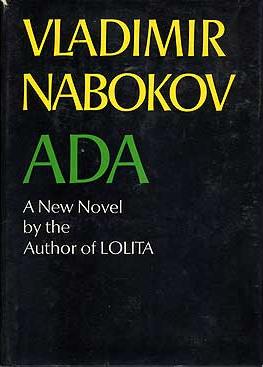
Ada or Ardor: A Family Chronicle is a novel by Vladimir Nabokov published in 1969.
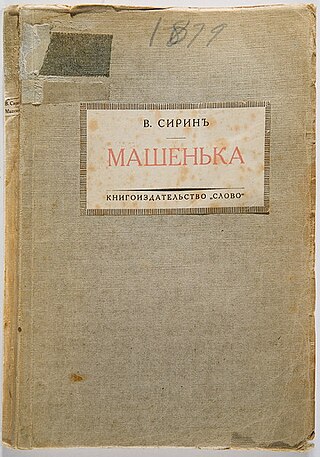
Mary is the debut novel by Vladimir Nabokov, first published under the pen name V. Sirin in 1926 by Russian-language publisher "Slovo".
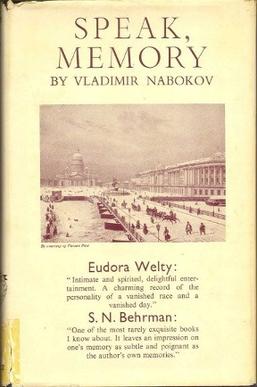
Speak, Memory is an autobiographical memoir by writer Vladimir Nabokov. The book includes individual essays published between 1936 and 1951 to create the first edition in 1951. Nabokov's revised and extended edition appeared in 1966.
Carmelina Marchetta is an Australian writer and teacher. Marchetta is best known as the author of teen novels, Looking for Alibrandi, Saving Francesca and On the Jellicoe Road. She has twice been awarded the CBCA Children's Book of the Year Award: Older Readers, in 1993 and 2004. For Jellicoe Road she won the 2009 Michael L. Printz Award from the American Library Association, recognizing the year's best book for young adults.
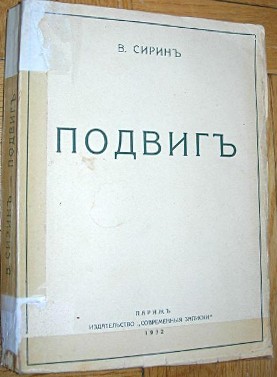
Glory is a Russian novel written by Vladimir Nabokov between 1930 and 1932 and first published in Paris.
Gail Jones is an Australian novelist and academic.
"Spring in Fialta" is a short story written by Vladimir Nabokov in 1936, originally as Весна в Фиальте in Russian, during his exile in Berlin. The English translation was performed by Nabokov and Peter Pertzov. Spring in Fialta is included in Nine Stories and Nabokov's Dozen.
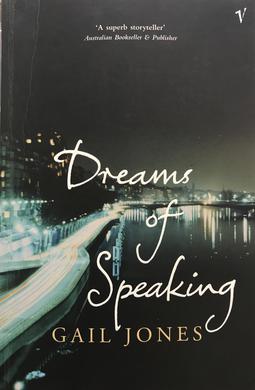
Dreams of Speaking is a 2006 novel by Australian author Gail Jones. Similar to Jones’ first two novels, Sixty Lights and Five Bells, Dreams of Speaking also explores the concept of modernity and its effect on understanding ourselves. The novel moves through time and space, following a reflective writing style. Following a few months in the life of a young Australian writer, Alice Black, the novel weaves through time to explore Alice's journey as a young Australian academic conducting research on the concept of modernity. The novel begins in Perth, Western Australia, and follows Alice's travels to Paris and Tokyo. As she chases the true meaning of modernity, Alice unintentionally learns more about her world and herself. Jones’ includes disparate elements in her novel including letters between the characters and facts. Overall, the novel received mixed reviews from eminent critics.

Lolita is a 1955 novel written by Russian-American novelist Vladimir Nabokov that addresses the controversial subject of hebephilia. The protagonist is a French literature professor who moves to New England and writes under the pseudonym Humbert Humbert. He describes his obsession with a 12-year-old "nymphet", Dolores Haze, whom he kidnaps and sexually abuses after becoming her stepfather. Privately, he calls her "Lolita", the Spanish nickname for Dolores. The novel was originally written in English, but fear of censorship in the U.S. and Britain led to it being first published in Paris, France, in 1955 by Olympia Press.
Jane Godwin is an Australian author, and is a publisher at Penguin Books Australia for children and young adult books.

Ancient Light is a 2012 novel by John Banville. First published on 7 July 2012, the novel concludes a trilogy concerning Alexander Cleave and his daughter, Cass. Eclipse (2000) and Shroud (2002) were Ancient Light's literary predecessors in the Banville canon.
Souvankham Thammavongsa is a Laotian Canadian poet and short story writer. In 2019, she won an O. Henry Award for her short story, "Slingshot", which was published in Harper's Magazine, and in 2020 her short story collection How to Pronounce Knife won the Giller Prize.

Melissa, previously published as George until April 2022, is a children's novel about a young transgender girl written by American author Alex Gino. The novel tells the story of Melissa, a fourth-grade girl who is struggling to be herself to the rest of the world. The rest of the world sees Melissa as George, a boy. Melissa uses the class play, Charlotte's Web, to show her mom that she is a girl by switching roles with her best friend, and playing the part of Charlotte. Scholastic first published the novel on August 25, 2015, and it has had a mixed reaction because of its LGBT+ content. In 2021, Gino retitled the novel Melissa.
Caitríona Lally is an Irish writer. She has published two novels: Eggshells (2017) and Wunderland (2021). In 2018 she was awarded the Rooney Prize for Irish Literature.

Drive Your Plow Over the Bones of the Dead is a 2009 mystery novel by Olga Tokarczuk. Originally published in Polish by Wydawnictwo Literackie, it was later translated to English by Antonia Lloyd-Jones and published in 2018 by the British independent publisher Fitzcarraldo Editions. The book received a wider release in 2019 when it was published in the United States by Riverhead Books on 13 August 2019. A portion of the English translation was originally published in literary magazine Granta in 2017.

The Frolic of the Beasts is a 1961 novel by Yukio Mishima. It is considered a minor work from Mishima's middle period. Drawing inspiration from Noh plays, specifically the 14th-century Motomezuka, the novel centers on a tragic love triangle depraved by adultery and violence. It is a short novel in length and has a nonlinear narrative structure. The novel was first serialised thirteen times in the weekly magazine Shukan Shincho between 12 June 1961 and 4 September 1961. It was published in hardcover format by Shinchosha on 30 September 1961. It was published in paperback by Shincho Bunko on 10 July 1966. The novel was translated into Italian by Lydia Origlia and published by Feltrinelli in September 1983. The novel was translated into English by Andrew Clare and published in paperback format in the United States and Canada by Vintage International on 27 November 2018. Clare's translation was later published in paperback in the United Kingdom by Penguin Modern Classics on 4 April 2019. The English translation was re-released in the United Kingdom on 2 November 2023 as part of Penguin's Japanese Classics series.

Girl in White Cotton is the debut novel by Avni Doshi, an American writer of Indian origin. Doshi wrote the novel over the course of seven years. It tells the story of a troubled mother-daughter relationship in Pune, India. The novel was first published in India in August 2019. It was published in the United Kingdom under the title Burnt Sugar in July 2020.

The Only Good Indians is a 2020 horror novel by Stephen Graham Jones. It was first published on July 14, 2020, through Saga Press and Titan Books.













